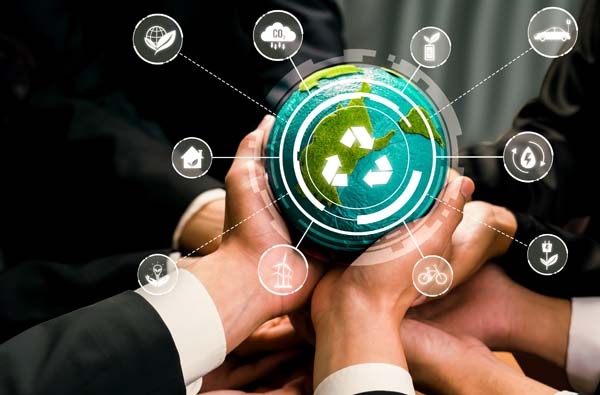
Sourced from ExportersIndia.com
February 1, 2024: Rising environmental consciousness is driving a revolutionary shift in the business-to-business (B2B) sector. Green technology is now a key component of B2B innovation and success, comprising solutions that reduce ecological effects across the supply chain. It is no longer only an optional benefit.
The integration of science and technology to reduce human impacts on the environment is referred to as Green Tech" or Green Technology. Research in energy, atmospheric science, agriculture, material science, hydrology, and other fields are included in the broad field of Green Technology. The main goal is to provide solutions that support sustainability in a variety of sectors and lessen their negative ecological effects.
Large-scale changes in business-to-business transactions are being sparked by green technology. Businesses are coming up with creative methods to lessen their environmental impact, from carbon-neutral shipping to eco-friendly packaging materials and renewable energy options for data centres. These developments improve efficiency, maximise resource management, and foster a favourable brand image in addition to being consistent with moral and sustainable business practices. Green technology gives B2B enterprises a significant competitive edge as customer demand for ethical products rises.
Here's how B2B platforms can foster green technology:
Encouraging green connections: B2B platforms can initiate connecting manufacturers with sustainable technology and practices to business-to-business clients looking for green solutions. By facilitating these connections, B2B platforms can contribute to the widespread adoption of green technologies across industries.
Promoting eco-friendly activities: The B2B platforms can encourage its members to engage in sustainable business practices. This includes supporting initiatives aimed at reducing waste, conserving resources, and utilising eco-friendly products. They can create a corporate ecosystem that is more sustainable by encouraging environmentally beneficial operations.
Using green technologies internally: It is crucial for B2B platforms to lead by example. It is important to dedicate efforts to reduce the environmental impact, putting in place energy-efficient infrastructure, and using ethical waste management techniques.
B2B platforms like ExportersIndia.com which is India's largest online B2B marketplace, firmly believes in the philosophy of green technology. Exporters India was established to enable businesses to access a worldwide customer base. It recognises that sustainability is not just an ethical imperative but also essential for long-term success in the current market.
The B2B industry's increasing use of green technology represents an immense change towards a more ethical and sustainable corporate environment. By linking companies, encouraging environmentally friendly practices, and setting an example, business-to-business platforms play a critical role in accelerating the adoption of green technology. Businesses that use green technology will not only help create a healthier world but will also establish themselves as industry leaders as the demand for morally and environmentally conscious goods grows.
The advantages of adopting green technology extend far beyond mere compliance. Businesses can reap numerous benefits, including:
Reduced operating costs: Energy, water, and waste disposal costs may be significantly reduced by using green technology including water conservation measures, smart building systems, and energy-efficient equipment.
Enhanced brand reputation: Businesses may attract environmentally sensitive investors and customers by showcasing their commitment to sustainability.
Enhanced employee engagement: Employees are becoming more driven to work for organizations that place a high priority on sustainability. Green initiatives have the potential to increase staff engagement and morale, which can improve retention and productivity.
Reduced risk and increased resilience: Resource disruptions and extreme weather occurrences are two of the major threats that climate change brings to organizations. Green technologies, which encourage resource independence and operational efficiency, can help reduce these risks and increase resilience.
Competitive advantage: Businesses that use green technology obtain an advantage over the competitors by providing more ecologically friendly goods and services in a market that is becoming more and more concerned with sustainability.
Green technology adoption in B2B is becoming a mainstream movement. Green technology will be even more crucial to the success of businesses as environmental concerns and laws continue to rise. The businesses that adopt green technology now will have the best chance of prospering in a sustainable future.
Businesses are implementing green solutions into their operations at a quick pace due to investor pressure, environmental requirements, and the possibility of significant advantages. The benefits of green technology are numerous, ranging from cost savings and improved brand recognition to risk mitigation and competitive advantage. Green solutions will likely be adopted even more widely in the B2B sector as costs come down and technology advances, opening the door to a more robust and sustainable future.